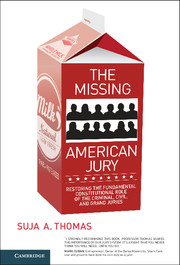 The Missing American Jury
The Missing American Jury Book contents
- Frontmatter
- Contents
- Acknowledgments
- 1 The Missing American Jury: An Introduction
- PART I The Jury Now
- PART II The Future Jury
- 4 Interpreting Jury Authority
- 5 Restoring the Jury
- 6 Beyond the Constitution: Affirming a Role for Lay Jurors in America's Government and World-Wide
- 7 A Branch Among Equals in American Democracy: A Conclusion
- Index
7 - A Branch Among Equals in American Democracy: A Conclusion
from PART II - The Future Jury
Published online by Cambridge University Press: 05 June 2016
- Frontmatter
- Contents
- Acknowledgments
- 1 The Missing American Jury: An Introduction
- PART I The Jury Now
- PART II The Future Jury
- 4 Interpreting Jury Authority
- 5 Restoring the Jury
- 6 Beyond the Constitution: Affirming a Role for Lay Jurors in America's Government and World-Wide
- 7 A Branch Among Equals in American Democracy: A Conclusion
- Index
Summary
This book has recognized the jury's fundamental constitutional role alongside the executive, the legislature, the judiciary, and the states. It has also discussed the jury's innate value over these traditional actors for deciding the questions of whether a person is punished and whether a person receives monetary damages. Outside of the jury's constitutional necessity and inherent comparative importance, it can serve another particularly significant role – for civil liberties and civil rights.
Writing about the mass incarceration of African-Americans in this country, Michelle Alexander has written about the New Jim Crow in criminal law. Much of the modern segregation about which Alexander writes is actually connected to the lack of jury trials. As discussed in Chapter 2, the community generally does not determine whether crimes have been committed and whether to punish. It also does not decide whether people should be compensated for wrongs committed against them. Instead, the executive, the legislature, the judiciary, and the states decide. The most vivid display of this authority is the imposition of punishments through plea bargaining. In this system, a person can be forced into prison by the false choice of a plea to a charge with less punishment or a jury trial on the threatened charge with a higher sentence. In other circumstances that involve civil liberties, juries may not decide the issue of whether people should be compensated where the government improperly treated them. So, if the government takes land from a family or imprisons a person unjustly, often a judge, not the community, is given the opportunity to decide whether a remediable harm occurred. As a final example, civil rights laws gave people the ability to challenge discrimination in the workplace. However, a jury may never decide this issue if a judge determines the employee does not have sufficient evidence of discrimination.
The most consistent themes against the jury deciding these cases have been cost and efficiency. As discussed in Chapter 4, the Founders either considered those factors in framing the government or rejected their relevance. Indeed, many major changes for the advancement of civil liberties and civil rights have occurred despite increased costs coming with change. Although its economic impact was far-reaching, slavery was eliminated. Although there would be costs to enforcing civil rights, those laws were enacted.
- Type
- Chapter
- Information
- The Missing American JuryRestoring the Fundamental Constitutional Role of the Criminal, Civil, and Grand Juries, pp. 235 - 238Publisher: Cambridge University PressPrint publication year: 2016


